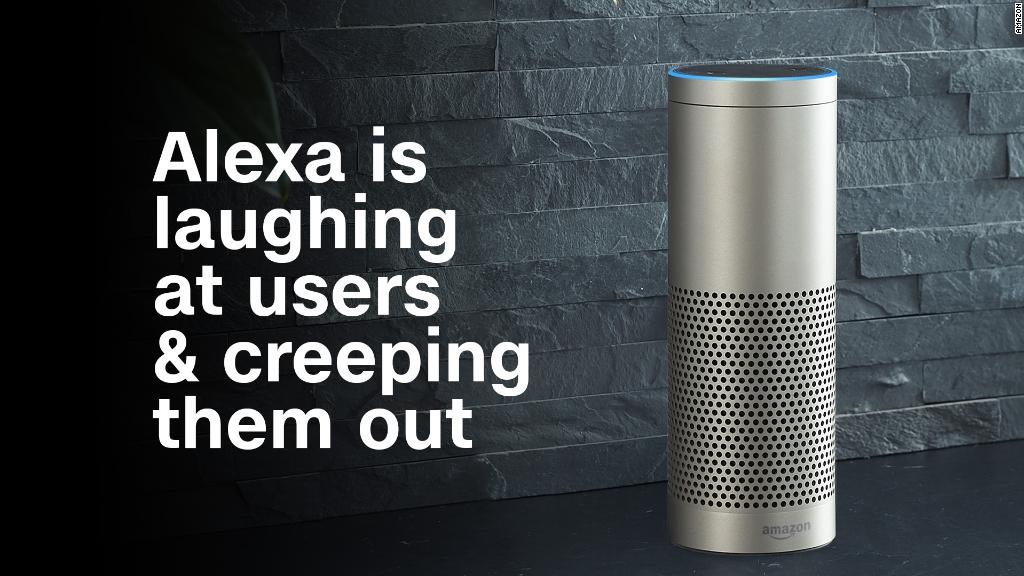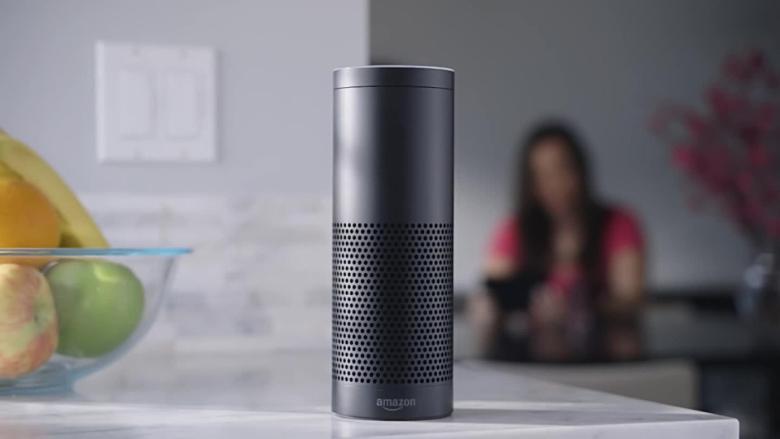
Americans are turning to Alexa to fill their pantries and stock their medicine chests.
That's a challenge for brands — maybe the biggest in two decades.
As smart speakers take off, companies like General Mills (GIS), Hershey (HSY), and Procter & Gamble (PG) are racing to understand the technology and make their products stand out.
"A new Wild West has opened up," said Z. John Zhang, a marketing professor at the Wharton School of Business. "Alexa is the gatekeeper."
The scramble recalls the early days of the internet, when new competitors sprouted online and forced established brands to adjust their strategies, he said.
Related: Amazon shows off Alexa-filled homes of the future
Smart speakers account for $2 billion in annual sales today, a tiny fraction of all shopping. But that's expected to grow to $40 billion in four years, the business advisory firm OC&C Strategy Consultants estimates.
Amazon leads the field with 20 million Alexa-enabled Echo devices in about 10% of US households, the firm found. Smart speakers have become so mainstream that CEO Jeff Bezos starred in a Super Bowl ad about Alexa this year. Google Home, Apple HomePod and Microsoft Cortana are growing, too.
For food and household companies especially, it's an urgent puzzle to solve because they're already under pressure. Niche competitors are growing. Retailers are slashing prices to compete against Amazon. And commodity costs are rising.
2018 has been a bloodbath for consumer staples stocks. The sector is the S&P 500's worst performer this year. General Mills and P&G have dropped 28% and 20% respectively. Hershey (HSY) has lost 18%.
From supermarkets to voice
For decades, people bought household staples at the grocery store or at big-box retailers, and manufacturers had a blueprint to build brand awareness.
They spent billions on logos, packaging and advertising. Producers like P&G paid top dollar to get their products in prime center-aisle shelves at eye-level, and for promotional banners around the store.
Related: The fight over razor, diaper and shampoo prices
Online shopping created a different headache. Amazon opened the door for small companies to sell on its marketplace and gave customers limitless choices to scroll through. But companies could still pay for sponsored ads to get on the first page of Amazon and Google searches.

Now Alexa and other smart speakers are upending shopping again, serving as a "traffic cop" directing purchases, Zhang said.
The power of Amazon's Choice
When you shop on Alexa, you can order a specific brand, like Colgate toothpaste or Head & Shoulders shampoo, or you can request a general product. It makes a big difference.
If you say, "Alexa, order me paper towels," the voice assistant defaults to a suggestion based on your past Amazon purchases. But if you've never ordered paper towels, Alexa will recommend one or two Amazon Prime products through an algorithm.
Related: Amazon unveils colorful Echo Dot for kids
That's most likely to be a product with an Amazon's Choice badge, according to a study last year by L2, a business analytics firm. Amazon has the power, and its top recommendations rarely change over time.
Amazon doesn't disclose the algorithm for the Amazon's Choice label. But a spokesperson says it considers product ratings, price and shipping speed.
Alexa is another way for Amazon to push customers to its own budding lineup of private-label products like Amazon Basics, Wickedly Prime and Presto.
Related: Now Amazon wants to feed your dog
Amazon's Choice for batteries is Amazon Basics. So if you say, "Alexa, order me batteries," you're more likely to get Amazon batteries than Duracell or Energizer. For paper towels, Amazon's Choice is Presto, not Bounty or Scott.
The designation is a threat to brands because they can't pay to get it.
Amazon's purchase of Whole Foods last year gives it even more leverage.
"Before long what you bought at Whole Foods will be what Alexa recommends," said Keith Anderson, a senior vice president of strategy and insights at e-commerce analytics firm Profitero.
How to win
To thrive in the voice era, companies must work closely with Amazon and revamp their advertising strategies to create brand loyalty. They will have to train you to specify a brand instead of making a broad request.
General Mills, for example, wants shoppers to say, "Alexa, order me Cheerios," instead of "Order me cereal."
Related: Inflation and sour yogurt sales sink General Mills
Experts say companies should focus on voice search optimization. They need to ensure that their product descriptions are relevant and easily categorized, and match up with how people request those products on smart speakers.
"If you search for Tide, you come up with about 10 to 15 different products and sizes. That is a minefield for a voice search," said OC&C associate partner John Franklin.
He said companies should also narrow their product ranges so shoppers aren't confused with dozens of sizes and variations. And they should keep brand names short and memorable. Catchy names and tag lines will outweigh colorful packaging in the age of Alexa.
It's too early to predict winners and losers. But brand names that have become synonymous with their products — think Q-Tips, Scotch Tape, Kleenex and Febreze — will probably benefit, said Brett Leary, a senior vice president at advertising agency Digitas.
Training the customer
Because Alexa repeats past purchases, it's more important than ever for brands to get into shoppers' carts through marketing and promotional campaigns.
So get ready to see ads online and on TV connecting brands to Alexa and pushing you to search for products through voice, possibly for a discount.
General Mills, the owner of Betty Crocker, developed an "ask Betty" app for Alexa last year, with recipes and cooking tips.
P&G believes its high-profile brands like Tide, Bounty and Gillette are at the top of consumers' minds and will position the company for the shift to voice shopping, spokesperson Damon Jones said. P&G has developed about a dozen Alexa skills, including the Tide app, which gives step-by-step instructions on removing stains.
But there's only so much P&G can do. Amazon still holds the most sway.
"There isn't a direct way for us to influence that," Jones said. "There aren't traditional 'advertising' options."

